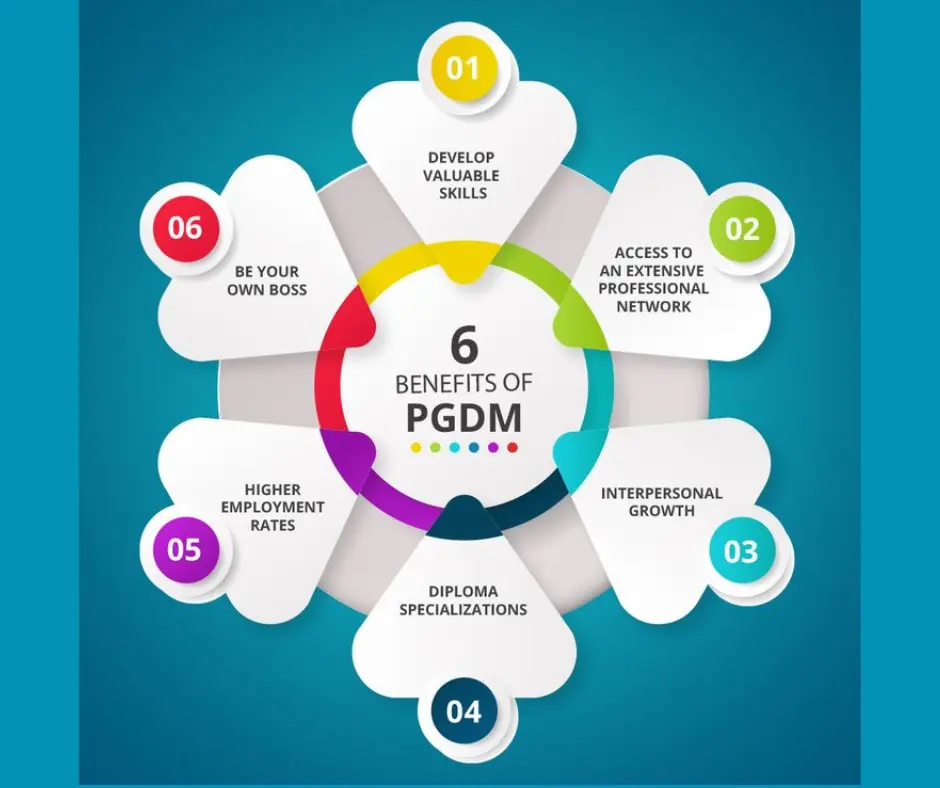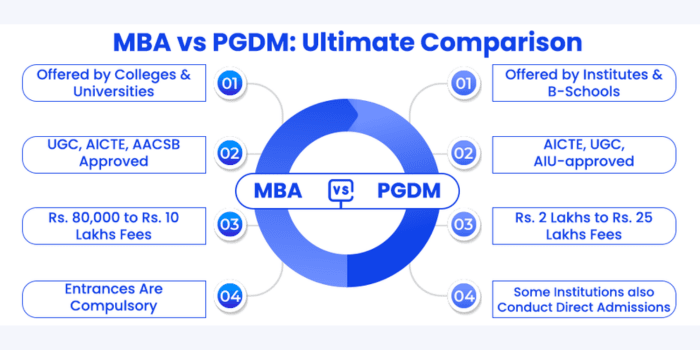PGDM Course Details & Admission Guidance
A PGDM (Post Graduate Diploma in Management) is a two-year program that focuses on practical business management skills. It’s quite similar to an MBA, but while MBAs are more theoretical, PGDM programs are designed to be more industry-focused and aligned with market needs.
To join a PGDM course, you need:
- A graduation degree in any discipline (preferably in commerce or management)
- At least 50% marks or an equivalent CGPA from a recognized university
- Most admissions are based on management entrance exams like CAT, MAT, CMAT, or SNAP
PGDM programs are popular because they are tailored to current industry trends. The syllabus is regularly updated to meet market demands, making it highly practical and relevant for today’s job market.
PGDM Course Details
A PGDM (Post Graduate Diploma in Management) is a two-year program designed to provide practical business and management skills. Below are the key details:
| Details | Information |
|---|---|
| Course Duration | 2 years |
| Eligibility | Graduation in any discipline (preferably commerce or management) with at least 50% marks |
| Admission Process | Entrance exams (e.g., CAT, MAT, XAT, SNAP) followed by Group Discussion (GD) and Personal Interview (PI) |
| Course Fees (INR) | ₹4,00,000 – ₹10,00,000 |
| Average Salary (INR) | ₹10 LPA – ₹14 LPA |
| Top Recruiters | McKinsey, BCG, Bain, Deloitte, PwC, EY, Accenture, and more |
| Job Profiles | Administrative Officer, Business Consultant, Finance Manager, HR Manager, PR Officer, Marketing Executive |
This program prepares you for roles in top companies and equips you with the skills needed to excel in the corporate world.
Why Pursue PGDM?
PGDM is one of the most sought-after courses for students aiming for a career in management. It not only opens doors to top managerial roles in leading organizations but also offers lucrative salary packages compared to other management degrees.
Key Benefits of PGDM:
- Specialized Courses
- Offers in-depth knowledge with specializations like Supply & Logistics, Marketing, Finance, Business Analytics, HR, and more.
- Includes industry-specific topics often not covered in MBA programs.

- Industry-Focused
- PGDM programs are updated regularly to match market trends, unlike MBA courses which often follow a static curriculum.
- Prepares students for current market conditions with a focus on practical and relevant skills.
- High Demand & Salary
- Equips students with job-ready skills that are highly valued by employers.
- Leads to better opportunities and higher salaries in industries.
- Corporate Readiness
- A direct pathway into the corporate sector with specialized and skill-based training.
- Requires less coursework compared to MBA to achieve similar results.
- Personality Development
- Builds critical thinking, communication, and leadership skills.
- Enhances decision-making abilities for workplace challenges.
Who should Pursue PGDM?
![]()
Students aspiring to build a career in management.
![]()
Individuals with leadership skills aiming for team management roles.
![]()
Graduates from any field looking to shift into management.
![]()
Professionals seeking career advancement or managerial roles.
![]()
Those with time or financial constraints, as online and distance PGDM options are available.
![]()
Experienced professionals aiming to move up the corporate ladder, as there are no age restrictions.
When to Pursue PGDM?
- With Work Experience :
Having 3–4 years of work experience before pursuing PGDM makes the degree more valuable for high-paying managerial roles. - After Graduation :
Fresh graduates can pursue PGDM, to enhance job opportunities and salary packages.
Financial Preparedness : Ensure you are ready for the financial investment required for a PGDM program.
Types of PGDM Programs
| Type | Eligibility | Admission Process | Fees (INR) |
|---|---|---|---|
| Full-Time | Bachelor’s degree with 50% marks | Entrance-based exams (CAT, MAT, etc.) | ₹4,00,000 – ₹10,00,000 |
| Online | Bachelor’s degree | Merit-based | ₹10,000 – ₹15,000 |
| Distance | Bachelor’s degree | Entrance-based exams | ₹30,000 – ₹50,000 |
Details of Each Type
1.Full-Time PGDM:
- Duration: 2 years
- Most popular format with specializations like Marketing, Finance, and HR.
- Admissions via national or university-level entrance exams like CAT, MAT, or GMAT.
2. Online PGDM:
- Short-term, self-paced courses offered by online platforms.
- Covers trending topics aligned with market needs.
- Affordable and flexible, ideal for working professionals.
3. Distance PGDM:
- Allows learning while working, with flexible study options.
- Lower cost and wide choice of colleges.
- Admissions through exams like CAT, MAT, or specific institute tests.
MYTH and Facts about PGDM
MYTH :Why PGDM Holds the Same Value as an MBA
MYTH :Why PGDM Holds the Same Value as an MBA
MYTH : PGDM is only for Businees Background Students
MYTH : Global Exposure Through PGDM
MYTH : Is PGDM Only for Future Managers? Debunking the Myth
MBA vs PGDM
MBA (Master of Business Administration) is a degree offered by universities and UGC-approved colleges, while PGDM (Post Graduate Diploma in Management) is a diploma offered by AICTE-approved autonomous institutes. Both are equally valued in the industry, but PGDM programs are often more industry-focused and flexible in their curriculum.

Distance PGDM
A Distance PGDM is a flexible option for students and working professionals to enhance their management skills. Many colleges and platforms in India offer this program. IGNOU is a popular choice for distance and online learning.
Admissions for Distance PGDM
- Admissions are based on entrance exams like CAT, MAT, and XAT.
- Some institutes have their own entrance exams for admission.
- Examples:
- IGNOU selects students through the OPENMAT exam.
- Symbiosis Centre for Distance Learning (SCDL) uses the SCDL-PGDBA exam.
Eligibility for Distance PGDM
To enroll in a Distance PGDM program, candidates must:
- Have a Bachelor’s degree in any field.
- Score at least 50% aggregate marks in 10+2 and graduation.
- Qualify in relevant entrance exams.
Distance PGDM is ideal for those seeking to balance education with work or other commitments.
Direct PGDM Admission (Without Entrance Exam)
Some institutes allow direct admission to the PGDM program without requiring you to take entrance exams like CAT, MAT, or CMAT. Instead, they select students based on a few basic eligibility conditions:
Completed graduation with at least 50% marks:
You must have finished your bachelor’s degree from a recognized university, and your overall marks should be at least 50%. This ensures you meet the minimum academic requirement.No age limit:
There is no restriction on age — both fresh graduates and working professionals can apply.Submit application forms and documents like transcripts and certificates:
To apply, you’ll need to fill out the college’s admission form and submit important documents such as your mark sheets, degree certificate, ID proof, and any other required paperwork for verification.















PGDM Colleges ( Delhi & NCR )
PGDM Colleges in Delhi
| College Name | Fees (INR) |
|---|---|
| Faculty of Management Studies, IIT Delhi | 4,80,000 |
| Indian Institute of Foreign Trade | 8,85,000 |
| International Management Institute | 8,70,000 |
| JMI (Jamia Millia Islamia) | 23,500 |
| Amity University | 6,72,000 |
| University of Delhi (FMS) | 96,000 |
| GD Goenka University | 3,72,500 |
| Asian Business School | 7,65,000 |
| KR Mangalam University | 2,60,000 |
| AKGIM | 1,27,943 |
| Delhi School of Business | 8,45,000 |
| Sharda University | 2,60,000 |
PGDM Colleges - Direct Admission
| College Name | Fees (INR) |
|---|---|
| IMM | |
| EMPI Institute | 8,95,000 |
| FIIB | 11,55,000 |
| G.L.Bajaj | 7,85,000 |
| Lloyd | 8,50,000 |
| IBI | 9,85,000 |
| GIBS | 11,25,000 |
| GIMS (GNIOT) | 8,37,000 |
| Mangalmaya | |
| Fostima | |
| IILM | |
| IIEBM |
PGDM Course Structure and Details
The PGDM course combines two key components:
- Core Courses: Cover foundational areas of management.
- Elective Courses: Focus on job-specific skills and knowledge.
Below is the semester-wise breakdown of the PGDM syllabus:
| Semester | Subjects |
|---|---|
| I | Management Functions & Behavior, Human Resource Management, Economic and Social Environment, Introduction to IT |
| II | Operations Management, Marketing Management, Quantitative Techniques, Managerial Economics, Strategic Management |
| III | Marketing Management, Financial Management, International Business, HR Management, Operations Management, Information Systems, Insurance Management |
| IV | Business Law & Corporate Governance, International Business, Management Information Systems, Research Methodology, Project Work |
PGDM Core and Elective Subjects
Core Subjects: Managerial Economics, Business Ethics, Basics of Marketing, Strategic Management, Organizational Behavior.
Elective Subjects: Business Analytics, Finance & Accounting, International Business, Research Methodology, Production & Operations.
PGDM Specializations
PGDM in International Business
- Duration: 2 years
- Fees: INR 4-10 Lakh
- Salary: INR 4-10 LPA
PGDM in Operations Management
- Duration: 2 years
- Fees: INR 3-10 Lakh
- Salary: INR 4-8 LPA
PGDM in Business Analytics
- Duration: 2 years
- Fees: INR 4-12 Lakh
- Salary: INR 6-12 LPA
PGDM in Marketing
- Duration: 2 years
- Fees: INR 4-8 Lakh
- Salary: INR 7.55-11 LPA
PGDM in Finance
- Duration: 2 years
- Fees: INR 5-10 Lakh
- Salary: INR 8-20 LPA
PGDM in HR
- Duration: 2 years
- Fees: INR 4-8 Lakh
- Salary: INR 5-9 LPA
PGDM in Supply Chain Management
- Duration: 1-2 years
- Fees: INR 5-12 Lakh
- Salary: INR 7-12 LPA
PGDM Admission Process
- Eligibility: Bachelor’s degree with 50% marks from a recognized university. No age limit.
- Entrance Exams: CAT, MAT, XAT, GMAT, SNAP, CMAT, ATMA.
CAT vs MAT Comparison
| Parameter | CAT | MAT |
|---|---|---|
| Number of Sections | Three | Five |
| Duration | 180 minutes | 150 minutes |
| Total Questions | 100 | 200 (40 per section) |
| Test Frequency | Once a year | Four times a year |
| Difficulty Level | High | Moderate |
| Marking Scheme | +4 for correct, -1 for wrong | +1 for correct, -0.25 for wrong |
| Major Colleges Accepting | IIMs, IITs, FMS, MDI | Christ College, BIMTECH, IMS |
This simplified format provides clarity on PGDM details, structure, and admissions.
Careers after PGDM
Completing a PGDM course opens doors to multiple job opportunities in both the public and private sectors. Graduates can earn an average salary of INR 5-10 LPA as freshers.
Many students also opt for teaching or research roles in educational institutions. They can become professors or trainers in areas like management, accounting, business, or soft skills, sharing their knowledge with future professionals.
Popular PGDM Job Roles and Salaries
| Job Role | Average Salary (INR) |
|---|---|
| Business Consultant | 9.86 LPA |
| Marketing Manager | 7.15 LPA |
| HR Manager | 7.15 LPA |
| PR Officer | 3.01 LPA |
| Finance Manager | 10 LPA |
| Strategic Manager | 10.84 LPA |
| Brand Manager | 10.55 LPA |
| International Sales Manager | 10.80 LPA |
PGDM Placement Highlights
Some of the top companies offering placements and their average salary packages are listed below:
| Company | Average Salary (INR) |
|---|---|
| Hero Motocorp | 19.05 LPA |
| Mahindra & Mahindra | 18.43 LPA |
| Maruti Suzuki | 24.45 LPA |
| Tata Motors | 22.85 LPA |
| Bosch | 22.40 LPA |
| State Bank of India | 20.70 LPA |
| Ultratech Cement | 28.03 LPA |
| Kajaria Ceramics | 18.39 LPA |
| Pidilite Industries | 25.30 LPA |
| ITC Limited | 19.67 LPA |
| HCL | 17.30 LPA |
| Wipro Infotech | 21.30 LPA |
| Amazon | 19.30 LPA |
| Apollo Hospitals | 22.95 LPA |
| Larsen & Toubro | 24.80 LPA |
| Shell | 21.25 LPA |
| Hindustan Unilever | 23.70 LPA |
| Asian Paints | 20.42 LPA |
| Vedanta Group | 21.44 LPA |
| Bharti Airtel | 21.80 LPA |
| HDFC Bank | 18.60 LPA |
| ICICI Bank | 18.19 LPA |
| Jet Airways | 15.00 LPA |
| MRF Tyres | 24.20 LPA |
With the right skills and effort, PGDM graduates can secure high-paying jobs in leading companies across industries!
Everything You Need to Know About MBA Internships
MBA internships turn classroom learning into real-world expertise, helping students build skills, gain industry exposure, and clarify career goals. They enhance resumes, create professional networks, and often lead to Pre-Placement Offers (PPOs). By actively engaging in meaningful internships, MBA aspirants gain a competitive edge and strengthen their placement prospects. Ultimately, internships serve as a powerful launchpad for a successful management career.
LinkedIn Strategies to Get Powerful MBA Recommenders
Your LinkedIn profile is more than a digital résumé—it’s a powerful tool that can shape MBA admissions outcomes. From crafting a strong personal brand to securing impactful recommendations, a polished LinkedIn presence can set you apart as a future business leader.
MBA Admissions After Exams: Waitlist,Acceptance and Next Steps Guide
After MBA entrance exams, candidates face critical decisions—accepting an offer, navigating a waitlist, or handling rejection. Whether confirming admission, boosting your waitlist profile, or exploring alternative programs, strategic planning and timely actions can keep your management career on track.
Common MBA Application Mistakes Explained: How to Get Accepted
Applying for an MBA is competitive, and even strong candidates often make avoidable mistakes. From vague goals and generic essays to poorly written resumes and inconsistent applications, such errors can reduce your chances of admission. Understanding these pitfalls helps you present a clear, compelling, and well-structured profile. Here are the 10 most common MBA application mistakes and how to avoid them.
Placements Explained: How to Read & Interpret MBA/PGDM Placement Reports (2025 Guide)
MBA placement reports provide crucial insights into salary trends, recruiter diversity, and industry demand. From PPOs and internship-driven offers to roles in consulting, finance, IT, and e-commerce, these reports reflect real career outcomes. Understanding averages vs. medians and sector-wise hiring helps aspirants set realistic expectations. With strong recruiter participation, 2025 placements reaffirm the value of an MBA in driving career growth.
Complete Guide to PGDM Scholarships: Eligibility, Rewards & Application Process
“Scholarships make PGDM education accessible by easing financial pressure and rewarding merit. From UGC Merit Scholarships to ONGC, SC/ST, and OPJEMS schemes, students have multiple options to fund their studies. These initiatives not only recognize academic excellence but also empower students from diverse backgrounds. With the right awareness and timely applications, aspirants can transform their management dreams into reality.”
